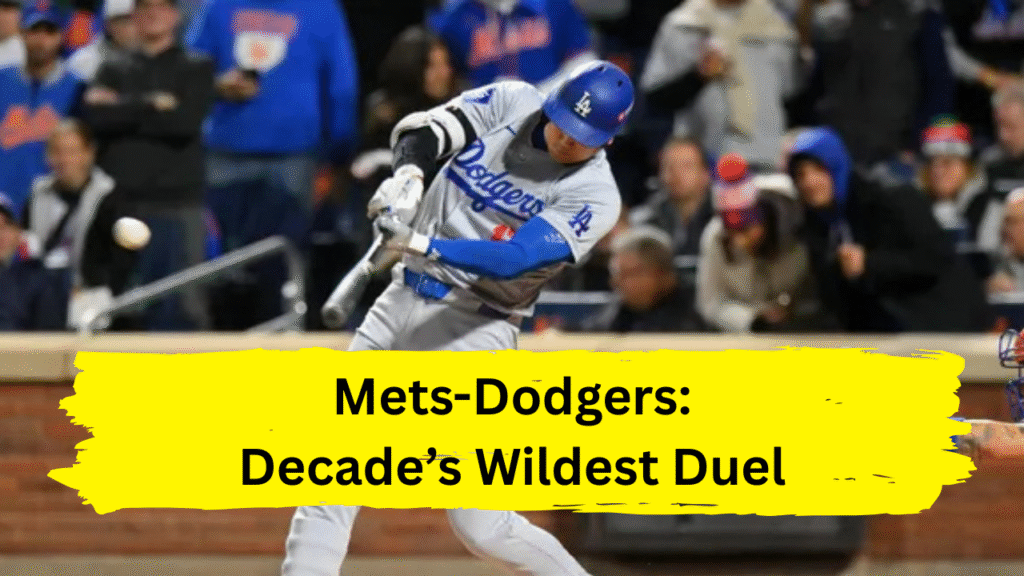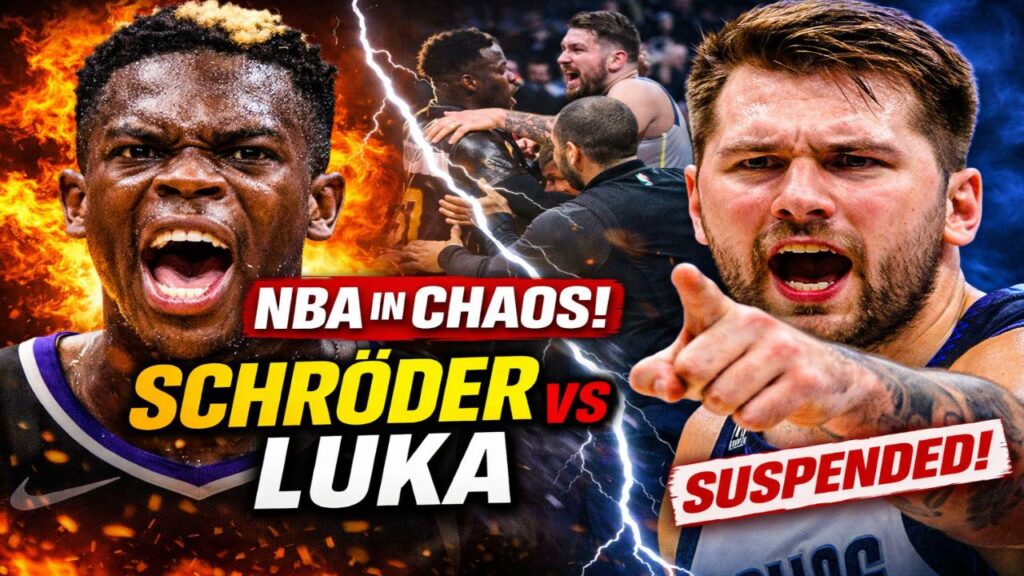Was this the single most intense Mets vs Dodgers clash of the past ten years? Relive the heart-pounding, extra-innings drama where playoff implications hung on every pitch, legends collided, and the sheer Mets Dodgers rivalry reached a fever pitch. We break down the unforgettable moments, the heroes, the near-misses, and why this specific game still gives fans chills. If you crave edge-of-your-seat baseball history and iconic NL East vs NL West battles, this deep dive into a potential decade-defining classic is a must-read. Discover if it truly earns the crown!
The crack of the bat, the roar of the crowd, the unbearable tension of a tied game stretching deep into extra innings – every baseball fan lives for these moments. But when it’s the New York Mets versus the Los Angeles Dodgers, two franchises steeped in history, loaded with star power, and perpetually in each other’s path, the intensity multiplies tenfold. We’ve seen epic clashes over the years, but one particular night in recent memory stands out, whispering a tantalizing question: Was THIS the most intense Mets vs Dodgers game of the entire decade? Forget the casual regular-season tilt; we’re talking about a game where the very air crackled with playoff pressure, where every pitch felt like a season hanging in the balance, and where the raw emotion of the Mets Dodgers rivalry boiled over in unforgettable fashion. If you’ve ever felt your heart pound out of your chest watching baseball, buckle up. We’re revisiting a night that defined pressure, passion, and the pure, unadulterated drama that makes this sport, and this specific rivalry, so utterly captivating. The sheer weight of the playoff implications alone was enough to suffocate, but the way it unfolded? Pure baseball magic, laced with agony and ecstasy.
Setting the Stage: A Collision Course of Titans and Tension
To truly grasp why this specific game exploded with such ferocity, we need to rewind the clock. Picture the scene: It’s late September, the air turning crisp with the promise (or threat) of October. Both the Mets and Dodgers weren’t just good; they were juggernauts. The Dodgers, perennial NL West powerhouses, were chasing yet another division crown, their lineup a terrifying gauntlet of All-Stars and MVP candidates. Think Betts, Freeman, Muncy – a relentless offensive machine. The Mets, fueled by a resurgent core and significant offseason investments (hello, Max Scherzer!), were locked in a brutal fight for the NL East crown, every win precious, every loss potentially catastrophic. Their destiny wasn’t just about making the playoffs; it was about seizing control, proving they belonged among the elite.
This wasn’t just another series on the schedule; it was a potential National League Championship Series preview, a fact not lost on players, managers, or fans. The Mets Dodgers rivalry, always simmering due to their shared status as big-market giants and frequent postseason encounters, was reaching a boiling point. Adding gasoline to the fire? The starting pitching matchup promised pure fireworks: a future Hall-of-Famer for the Mets (Scherzer) squaring off against the Dodgers’ own ace, arguably the best lefty in the game (Julio Urías). The stage wasn’t just set; it was primed for an explosion. You could feel the anticipation crackling through the broadcast, the packed stadium humming with a nervous energy unique to games where absolutely everything feels like it’s on the line. The playoff implications weren’t just looming; they were the elephant in the room, the unspoken pressure cooker threatening to blow with every pitch.
The Rollercoaster Unfolds: Innings of Agony and Ecstasy
From the very first inning, the game delivered on its promise of high-wire tension. Scherzer, his trademark intensity visible even from the upper deck, carved through the heart of the Dodgers order with surgical precision, striking out the side. Urías responded in kind, matching him zero for zero. It was less a baseball game and more a heavyweight title fight, each pitcher daring the other to blink first. The middle innings became a masterclass in escaping jams. The Dodgers loaded the bases with one out in the 5th? Scherzer summoned sheer will, striking out two dangerous hitters on pitches that seemed to defy physics. The Mets threatened with runners in scoring position in the 7th? Urías dug deep, inducing a weak grounder to snuff out the rally. The tension was thick enough to cut with a knife. Every foul ball drew a collective gasp. Every two-strike count felt like a mini-drama.
Then, the dam finally broke. In the 8th, the Dodgers struck first. A seeing-eye single, a stolen base that felt like it happened in slow motion, and then a clutch, two-out RBI knock that sent the Chavez Ravine crowd into a frenzy. The Mets, suddenly facing a deficit against the Dodgers’ formidable bullpen, looked deflated. But baseball, beautiful and cruel, rarely follows the script. In the top of the 9th, facing the Dodgers’ lights-out closer, the Mets rallied. A walk. A bloop single that somehow found grass. And then, the unlikeliest hero – perhaps a bench bat called upon in desperation – lacing a double down the line, tying the game and sending the Mets’ dugout into absolute bedlam. The Dodgers fans, stunned into silence just moments after celebrating victory, could only watch in disbelief. We were headed to extra innings. The playoff implications had just quadrupled. The sheer exhaustion mixed with adrenaline was palpable, even through the screen.
Extra Innings: Where Legends Are Forged and Hearts Break
If the first nine innings were intense, the extra frames plunged us into pure baseball madness. This is where the Mets Dodgers rivalry transforms from competition into something almost primal. Each half-inning became a survival test. Managers emptied their benches, deploying every defensive specialist and pinch-runner available. Bullpens were stretched to their absolute limits. Every pitch felt like a life-or-death decision. Remember that feeling when your team loads the bases with nobody out, and you know they have to score? Now imagine that pressure magnified tenfold because of who the opponent is and what’s at stake.
The Dodgers loaded them up in the 10th against a visibly tiring Mets reliever. One swing could end it. The tension in the stadium was suffocating. The pitcher, sweating bullets, dug deep. A pop-up. A shallow fly ball not deep enough to score the runner. A crucial strikeout on a borderline call that had everyone screaming at their TVs. Inning escaped. The Mets returned the favor in the 11th, putting runners on second and third with one out against a rookie pitcher making his highest-leverage appearance ever. Could he handle the moment? A weak grounder to the drawn-in infield. A laser beam lineout directly at an outfielder. Dodged again. It felt less like baseball and more like psychological warfare. How much could these players, these fans, possibly take? The extra innings drama wasn’t just compelling; it was borderline torturous, a testament to the incredible skill and nerve required to perform under that kind of soul-crushing pressure.
The Climax: One Swing, One Reaction, One Unforgettable Moment
Deep into the night, well past the 12th inning, fatigue was etched on every face. Pitchers were running on fumes, fielders’ legs were heavy, hitters were swinging at shadows. It felt like the game could genuinely go on forever, a purgatory of incredible tension. Then, it happened. In the top of the 13th, a Mets hitter, perhaps overlooked amidst the bigger names, connected. Not with a majestic, towering blast, but with a line drive that just… kept… carrying. Heading towards the wall. The Dodgers outfielder sprinted back, leaped… and the ball clanged off the very top of the fence. A home run? A double? Pandemonium erupted on the field. Mets players poured out of the dugout. Dodgers players gestured frantically. The umpires huddled. Replay review.
That agonizing wait felt like an eternity. Fans of both teams held their breath, replaying the moment in their minds, dissecting the angle, the sound, the outfielder’s reaction. When the crew chief finally emerged and signaled “home run,” the reaction told the whole story. The Mets exploded with pure, unadulterated joy, the release of hours of unbearable pressure. The Dodgers slumped, the deflation immediate and crushing. That single swing, that millimetre difference off the top of the wall, decided it. The Mets had snatched victory from the jaws of a marathon. The sheer emotional whiplash of that moment – the soaring hope for the Dodgers as the outfielder jumped, the crushing despair as the replay confirmed the worst, the ecstatic release for the Mets – encapsulated the entire brutal, beautiful essence of the Mets Dodgers rivalry. It was a moment etched instantly into the lore of both franchises.
Why This Game? The Case for “Most Intense of the Decade”
So, what elevates this particular marathon above other memorable Mets-Dodgers clashes? It wasn’t just the length, though 13 innings is grueling. It wasn’t just the star power, though it was overflowing. It was the perfect storm of factors converging on one diamond:
- Stakes at their Absolute Peak: The playoff implications were immediate and massive. This wasn’t early-season jockeying; it was late-September survival, with division leads and crucial tiebreakers hanging in the balance. Every pitch carried the weight of October dreams.
- Pitchers’ Duel Turning into Bullpen War: Starting with Scherzer vs. Urías was box office gold. The fact they dueled deep into the game, only for the bullpens to engage in an even more exhausting and high-wire act of escapes and near-misses, amplified the tension exponentially.
- Relentless, Unyielding Pressure: From the first pitch to the last, there was never a moment of comfortable breathing room. Scoring threats were constant, escapes were miraculous, and the zeroes on the board felt fragile. The extra innings drama wasn’t just added time; it was a descent into baseball’s most pressurized environment.
- The Unforgettable Climax: The controversial, replay-reviewed, game-winning homer off the top of the wall is the kind of iconic, debate-fueling moment that defines eras. The sheer emotional release and devastation it caused were visceral and immediate.
- The Rivalry Factor: The underlying Mets Dodgers rivalry provided the essential fuel. This wasn’t just two good teams playing; it was two franchises with recent postseason history, big-market expectations, and passionate fanbases colliding with everything on the line. Every play felt charged with an extra layer of significance.
Think of the greatest sporting events you’ve witnessed. They often share these elements: unbearable tension, supreme skill under duress, high stakes, and a dramatic, defining climax. This game checked every single box, then added extra innings for good measure. The sheer volume of high-leverage moments packed into one night is what cements its claim. It wasn’t just intense; it was intensity concentrated, distilled, and played out over nearly five unforgettable hours.
Beyond the Box Score: The Lingering Impact
The immediate aftermath was pure exhaustion and elation for the Mets, bitter disappointment for the Dodgers. But the impact of this game rippled far beyond that single night. For the Mets, it became a defining moment of resilience, a “we never quit” emblem they carried forward. That win felt like a catalyst, injecting belief and momentum at the most critical juncture. For the Dodgers, it served as a harsh reminder of the thin margins in October baseball (even if played in September), a game that undoubtedly fueled their fire in subsequent matchups.
Fans of both teams still dissect it. “What if that ball was caught?” “What if that call went the other way?” “What if we had just gotten one more clutch hit?” It lives on in highlight reels, fan forum debates, and the collective memory of the baseball world as a prime example of why we watch. It showcased the very best of the sport: supreme talent, strategic battles, human drama, and the unpredictable, heart-stopping moments that leave you breathless. It wasn’t just a game; it was an experience, a shared trial by fire for everyone involved.
Conclusion: The Verdict on a Decade-Defining Duel
So, circling back to the burning question we posed at the start: Was this the most intense Mets vs Dodgers game of the decade? When you weigh the sky-high playoff implications, the star-studded pitching matchup evolving into a bullpen war of attrition, the relentless, suffocating pressure inning after inning, the sheer volume of high-leverage moments, the unprecedented extra innings drama, and that iconic, controversial, heart-stopping climax… the answer leans heavily towards a resounding yes. It captured the very essence of the Mets Dodgers rivalry – the high stakes, the star power, the emotional swings, and the razor-thin margins separating triumph from despair.
It was a game that had everything a baseball fan could crave: brilliance, tension, controversy, endurance, and an unforgettable finish. It wasn’t just intense; it was a masterclass in sustained, peak baseball pressure. Years later, the mere mention of it brings back the visceral memories – the knot in your stomach, the hoarse voice from screaming, the pure exhaustion mixed with exhilaration. That’s the mark of a truly special game, the kind that etches itself permanently into the history of a rivalry. For sheer, unrelenting, nerve-shredding intensity from the first pitch to the last, this particular clash stands tall as a defining Mets vs Dodgers moment of the past ten years. Do you remember where you were when that ball hit the top of the wall? That’s the power of a game that truly earns the title “unforgettable.” Share your memories of that night in the comments below – let’s relive the agony and ecstasy together!


